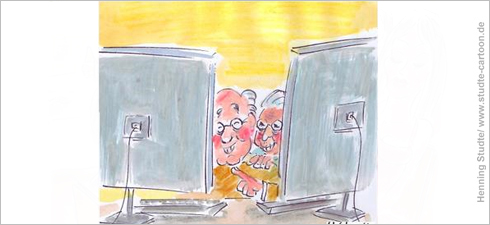Today, there’s been a rupture in our ageing societies of nannies, kindergartens and German-Dutch-Danish models of youth-aged living arrangements, and the connotation of an elderly relative has taken on wider and wiser proportions in ways of expressing disbelief. Das kannst Du Deiner Großmutter erzählen is the German way of saying I don’t believe what you say, so try telling your grandma that. The Italians agree: See mio nonno. They tell you where you can stick your exaggeration: Mia nonna en carriola (and my grandmother's in a wheelbarrow), whilst the French take the wheelbarrow theme further: Il ne faut pas pousser mémé dans les orties ("you shouldn’t push your grandmother into the stinging nettles"). Bushes and wheelbarrows aside, Germans in the seventies exclaimed: "Have you got a grandfather? Send him to Europe!" (Hast Du einen Opa, schick ihn nach Europa). The tables are turned here, and age is criticised for its political wisdom. The sentence bemoaned the inutility of the European parliament of the time, which it claimed was full of yawning oldies.
The German marketing term "BestAger" encapsulates the 50+ age group. Does it take its counter-inspiration from the term "teenager", and refer to someone in their golden years, a Brit in retirement? In Spain, they are jubilators – a pensioner is called a jubilado. From 1958 – 1966, the Polish television programme Kabaret Starszych Panów ("An Old Man’s Cabaret"), ran a popular theme tune, Wesołe jest życie staruszka: the life of an old man is the happiest. These "silver" (referring to greying hair colour) granddaddies and grandmommies surf the web and are shopaholics, which earn them the more modern English and German terms, Silver Surfers or Silvershoppers.
However, eastern European notions of the elderly are inevitably linked to poverty. The Polish toilet grannies (babcią klozetową ) are the women collecting small change for cleaning public toilets, initially in communist countries to stop toilet paper being stolen. These women have been immortalised by Polish-born director Roman Polanski in When Angels Fall (1959), and the Polish song Wielka miłość do babci klozetowej ("Great love to Toilet Granny") by the band Big Cyc. Even the verb of the Polish word for tramp, dziadować, has the same root as the word dziadek, meaning grandpa.
Aneta Marciniak Translation : cafebabel.com
Was this article useful? If so we are delighted!
It is freely available because we believe that the right to free and independent information is essential for democracy. But this right is not guaranteed forever, and independence comes at a cost. We need your support in order to continue publishing independent, multilingual news for all Europeans.
Discover our subscription offers and their exclusive benefits and become a member of our community now!












